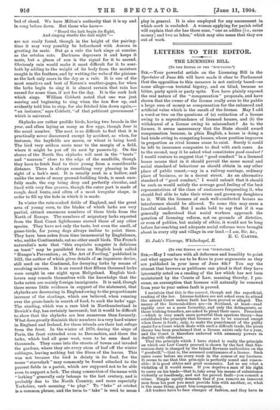THE LICENSING BILL.
SIR,—Your powerful article on the Licensing Bill in the Spectator of June 4th will have made it clear to Parliament that the opposition to this measure is not entirely based—as some allege--on teetotal bigotry, and on blind, because so bitter, party spirit or party spite. You have plainly exposed the real nature of the "compensation" proposals, and have shown that the owner of the license really owes to the public a large sum of money as compensation for the enhanced and artificial value which is the result of the license. May I add a word or two on the questions of (a) extinction of a license owing to a superabundance of licensed houses, and (b) the withdrawal of a license owing to misconduct ? As to the former, it seems unnecessary that the State should award compensation because, in plain English, a house is doing a bad trade owing to competing houses, whose position improves in proportion as rival houses cease to exist. Surely it could be left to insurance companies to deal with such cases. As to the second, may it be asked what constitutes good conduct ? I would venture to suggest that "good conduct" in a licensed house means that in it should prevail the same moral and social standard of behaviour as should obtain in any other place of public resort,—say in a railway carriage, ordinary place of business, or in a decent street. As an alternative standard of "good conduct," I would submit that it should be such as would satisfy the average good feeling of the best representatives of the class of customers frequenting it, who should feel able to take their wives and grown-up daughters to it. With the licenses of such well-conducted houses no interference should be allowed. To some this may seem a fanciful standard. But I make bold to say that if it was generally understood that social workers approach the question of licensing reform, not on grounds of dietetics, or even of politics, but mainly of ethics, it would not be long before far-reaching and adequate social reforms were brought about in every city and village in our land.—I am, Sir, &c.,
E. C. CARTER.
St. Jude's Vicarage, Whitechapel, E.
[To THR EDITOR OF VIE "sescrArort.".1










































 Previous page
Previous page